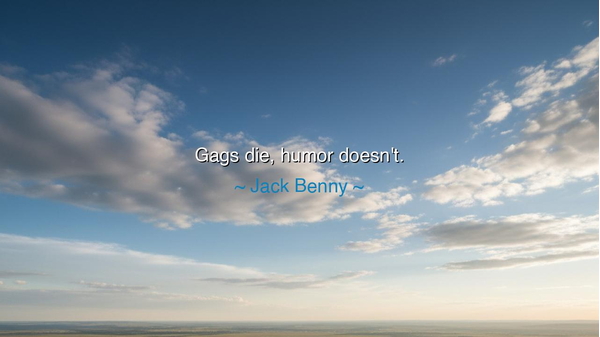
Gags die, humor doesn't.






“Gags die, humor doesn’t.” So spoke Jack Benny, the master of silence and timing, whose art of restraint made the world laugh for generations. In these few, simple words, he spoke a truth that echoes beyond the stage — a truth about what is fleeting and what endures, what is surface and what is soul. For gags are the sparks that flash for a moment; they dazzle, they amuse, and then they fade. But humor — true humor — is the quiet flame that burns within the heart, lighting the darkness of life itself.
In the days of the ancients, the storytellers knew this. They gathered around the fires of their tribes, not merely to jest, but to weave laughter into meaning. A gag — a jest without soul — is like a spark struck from stone: bright, but brief. It entertains, but does not heal. Yet humor, born of wisdom and compassion, is eternal; it speaks to the shared frailty of humankind. Benny understood that the laughter that endures is not the laughter of mockery, but of recognition — the laughter that says, “We are all in this together.”
Jack Benny himself was not the loudest comedian of his age, nor the most flamboyant. His art was in his patience, in the pause that came before the punchline. He would stand in silence, one eyebrow raised, allowing the absurdity of life to reveal itself. His audiences laughed not at his words, but at the reflection of themselves they saw in him — the proud man humbled, the serious man surprised, the ordinary man undone by small misfortunes. His humor lived in truth, and therefore, it did not die. Even when the gags of his era have turned to dust, his laughter remains alive in the soul of those who remember.
Consider also Charlie Chaplin, whose silent films spoke louder than any voice. His jokes — the slipping banana peel, the crooked walk, the chase — might seem simple gags, yet beneath them flowed rivers of humanity. When he tripped and fell, he fell not as a clown, but as every man who has stumbled under the weight of life. When he smiled again, he taught us that dignity could rise even from failure. The gags were the body; the humor was the soul. And souls do not perish.
The ancients might have said it thus: “The jest fades, but the spirit of laughter is immortal.” For humor, rightly understood, is not about ridicule but revelation. It is the art of holding a mirror to the absurdities of existence and finding in them both tenderness and courage. The gag is the shadow; humor is the light. One depends upon novelty, the other upon truth. The first seeks applause, the second seeks connection.
This is why Benny’s words carry the weight of prophecy. In an age of fleeting amusements — of jest without depth, of noise without wisdom — we must remember that the laughter that lasts is born not from cleverness, but from compassion. Gags die because they belong to their moment; humor lives because it belongs to the heart. True humor does not mock or divide; it unites. It is the bridge between sorrow and endurance, between tragedy and hope.
Let the young and the wise alike take this teaching to heart: do not chase gags, for they vanish like smoke. Seek instead the spirit of humor — the ability to laugh at oneself, to see grace in folly, and to comfort others with joy. Let your laughter spring from understanding, not from cruelty. Let it lift rather than wound. For humor, when pure, is one of the oldest medicines of the human race — and those who preserve it preserve their own humanity.
Remember, then, the wisdom of Jack Benny: “Gags die, humor doesn’t.” The gag is mortal; humor is eternal. Feed not only the mind with cleverness, but the soul with laughter that understands. For when the echoes of applause have long faded, and the jokes of the day are forgotten, the laughter of compassion — the laughter that heals — will still remain, glowing quietly in the hearts of those who dare to smile through the storms of life.






AAdministratorAdministrator
Welcome, honored guests. Please leave a comment, we will respond soon